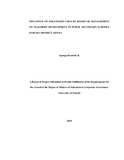| dc.description.abstract | In this era of globalization that comes with quality education for competitiveness,
principals and BOM members are being urged to exercise strong teacher
development in their schools. The purpose of this study was to investigate the
influence of strategies used by BOM on teachers‟ development in public
secondary schools in Busia district, Kenya. Specifically, the study sought to
establish the influence of Conflict Resolution Strategies (CRSs) adopted by BOM
on teachers‟ development, determine the influence of the training opportunities
offered by BOM members‟ for teachers‟ development, establish how the
provision of democratic atmosphere by BOM members influences teachers‟
development, and determine how delegation of responsibilities by BOM members
influences teachers‟ development in public secondary schools in Busia district.
This study was anchored on Herzberg's theories of employee motivation suitable
for assessing principals‟ and BOM members‟ effectiveness in teacher
development at school. The study was conducted using the descriptive survey
design which describes respondents‟ characteristics such as abilities, opinions,
attitudes, beliefs and/or knowledge. Therefore, this study aimed at capturing
respondents‟ opinions, attitudes, beliefs and knowledge based on teacher
development. The target population consisted of 28 public secondary school
principals, 410 teachers and 364 BOM members given that each school had an
average of 13 BOM. The sample size was 26, 200 and 188 public secondary
school principals, teachers and BOM members respectively. Simple Random
sampling was used to choose 2 schools, hence 2 principals, 10 teachers and 24
BOM members to take part in the piloting study. The main study, therefore,
consisted a total of 24 principals, 190 teachers and 164 Board of Management
(BOM) members. These questionnaires were designed based on the objectives of
the study and on the literature review. The researcher used the test retest method
to enhance instrument reliability. The study yielded data that required both
qualitative and quantitative analysis. Quantitative data was analyzed using
Statistical Packaging for Social Sciences (SPSS) while qualitative data was
organized into themes and patterns based on analysis of meanings and
implications emanating from respondents information and documented data on
academic performance. Quantitative results of data analysis were presented
mainly in tables. The study was to establish the influence of the strategies used by
BOM members on teacher development. As part of recommendations, teacher
development in educational institutions is crucial, hence BOM should be
appointed carefully to ensure that they are experienced. Besides, given the scope
and limitations of this study, the researcher recommends a replica of the study to
be performed in other public secondary schools in Kenya to cover other districts
apart from Busia district to provide comparison in findings. | en_US |

